/topics/governance
Governance
In remembrance of water: How a conglomeration of mining companies, politicians and real estate developers are endangering the vast aquifers that give Goans their water
Posted on 07 Jun, 2010 01:00 PM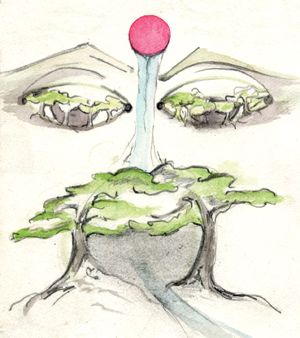 Author: Hartman de Souza Art: Jessica Schnabel Content Courtesy: Himal Southasian
Author: Hartman de Souza Art: Jessica Schnabel Content Courtesy: Himal Southasian
Where there is water, there is probably ore beneath.
Having trekked several times to Paikdev’s spring to gulp water pouring out of the moss-covered iron mouth, one would think the mysteries of the journey would fade. But, if anything, they have become more poignant – sitting here at this shrine to the snake deity of the Velip community in the village of Maina, in Goa’s Quepem District. It is here, amidst thousands of hectares of rolling forests, in the foothills of the Western Ghats, home to countless perennial springs and streams, wildlife and more, that a strange conglomeration of mining companies, politicians and real-estate developers are sharpening their collective sword. These activities were already afoot a year ago, with mining operations systematically destroying forests, because, as the government in Panjim stated at the time, the iron ore was needed by New Delhi to keep its nine-percent growth rate on track. This year, the message is no different.
Livelihoods magazine special issue on watersheds
Posted on 07 Jun, 2010 08:14 AM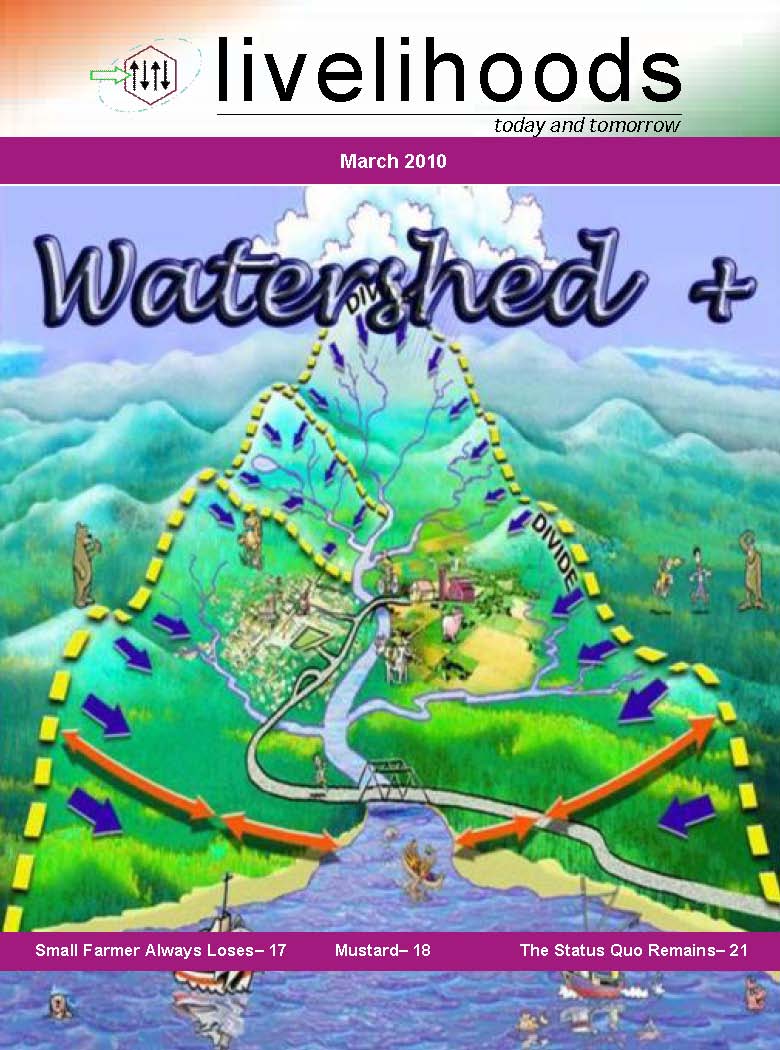 A special issue of the Livelihoods magazine (March 2010) brought out by the Akshara Network for Development Support Services, on Watersheds+.
A special issue of the Livelihoods magazine (March 2010) brought out by the Akshara Network for Development Support Services, on Watersheds+.
Increasing productivity of dry lands is possible through soil and moisture conservation (SMC) efforts results in growth led by increases in the farm output. Separate efforts are required to include the land-less and the vulnerable in this growth, so that they also realize the benefits of improved food security, increased employment and diversification of livelihoods. Such activities are known as ‘Watershed Plus’ interventions, and ‘livelihoods’ explores these activities.
Community initiative for efficient management of rural water supply in Assam
Posted on 06 Jun, 2010 10:18 PMDrinking Water Supply in rural areas of Assam ( India ) is managed by the Public Health Engineering Department (PHED), Government of Assam and the challenge is indeed enormous and achieving the targets requires well planned and strongly determined strategies and approach. Government has already formulated the necessary strategy to ensure sustained supply of safe drinking water in rural areas. However for achieving the desired end results from the Government initiatives, the community needs to be mobilized to own and sustain these programmes and to become an active partner in their implementation. For such a participatory demand driven approach, necessary awareness generation amongst the Community to realize the need for “total water security” and its impact on reduction of water borne diseases, is highly warranted.
National Water Mission under National Action Plan on Climate Change: Revised Comprehensive Mission Documents - Ministry of Water Resources (2009)
Posted on 05 Jun, 2010 11:46 PMThe National Water Mission (NWM), under the aegis of the Ministry of Water Resources, is one of the eight missions being constituted under the National Action Plan for Climate Change (NAPCC). The NAPCC was launched by the Prime Minister in 2009 as a nation-wide effort to tackle climate change.
Urban Development Policy 2009 - Department of Urban Development (Government of Karnataka)
Posted on 05 Jun, 2010 04:20 PMThe Urban Development Policy, Karnataka has been developed, by the Department of Urban Development (Government of Karnataka), as a response to the challenges that are being faced by the state due to rapid urbanisation leading to:
- An increase in population in urban areas due to migration
- Increase in the number of poor residents in urban areas
- Infrastructural shortfall on several fronts
- Shortage of resources
- The challenge of ensuring the basic welfare of the poor in urban areas
- The increasing need for strengthening governance, planning and administration
IEC in Jalswarajya Project (Maharashtra) - A guiding light for water supply sector
Posted on 01 Jun, 2010 11:51 PMIEC in Jalswarjya- A guiding light for WSSD, Govt. of Maharashtra
- An article based on vibrant experience of Jalswarajya Project
Prabhakar S. Mishra
IEC specialist, Nagpur
Introduction
Whenever we are working on development front we need to put communication at heart place. Worldwide past experience suggest that modernization approach of development communication fail to sustain impact on stakeholders due to its vertical one way format based on prejudice which fix responsibility of being backward on under develop class. Till end of 20th century mostly communication in development sector was argument and advocacy based. Also efforts initiated with expectation of switch effect behavioral change, that outcast trust from communication.
Water: Private, Limited - Issues in privatisation, corporatisation and commercialisation of water sector in India by Manthan Adhyayan Kendra
Posted on 31 May, 2010 02:44 PM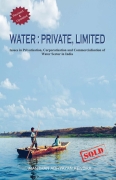 This book by Manthan Adhyayan Kendra, highlights the emerging issues related to privatisation of water in the context of the recent surge of privatisation-related initiatives in the water sector in India.
This book by Manthan Adhyayan Kendra, highlights the emerging issues related to privatisation of water in the context of the recent surge of privatisation-related initiatives in the water sector in India.
The history of attempts at privatisation of water till recent times from all across the globe indicate that they have been met with strong resistance where ever they have been implemented. This is because of the total failure of all these programmes to address the social responsibility of providing water to all without consideration of profits.
However, this backlash against privatisation has led international donor agencies to use a different type of strategy and language. This has led to a shift from Private Sector Partnership (PSP) to Public Private Partnership (PPP) and more recently to the Water Sector Reforms (WSR) in countries such as India.
The power of uncertainty: Reflections on the nature of transformational initiatives - Malcolm Adiseshiah Centenary Lecture by Mihir Shah
Posted on 26 May, 2010 11:21 PMIn this lecture, the author makes connections between the concepts of certainty and uncertainty and draws parallels between these and the scientific or the positivist approach and the phenomenalist approach. The author argues that the excessive emphasis on certainty, which is an inherent assumption of the scientific approach embraces reductionism, compartmentalisation and has been the principle underlying all disciplines such as developmental economics.
India's Sanitation for All: How to make it happen - An ADB report
Posted on 26 May, 2010 11:02 AM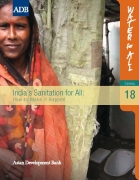 This discussion paper by ADB, examines the current state of sanitation in India in the context of the Millennium Developmental Goals, which call for a 50% reduction in the proportion of people without sanitation by 2015 and India's goal of providing Sanitation for All by the 2012.
This discussion paper by ADB, examines the current state of sanitation in India in the context of the Millennium Developmental Goals, which call for a 50% reduction in the proportion of people without sanitation by 2015 and India's goal of providing Sanitation for All by the 2012.
The paper targets policy makers, governmental ministries, state and local governments, non-governmental organisations, developmental agencies and all those who are involved in the planning and implementation of sanitation policies in India. It makes a few recommendations for the successful implementation of sanitation efforts in India.The focus of these recommendations is on household sanitation, which includes safe disposal of human excreta, as measured by household ownership of a sanitary latrine and household access to drainage facilities.
Negotiate: Reaching agreements over water - Paper by IUCN
Posted on 25 May, 2010 06:49 PM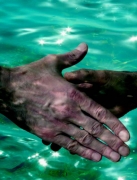 This book by IUCN is directed at practitioners involved in water-related negotiations that aim at fair and mutual agreements on optimum and sensible use of water by all. The book provides the necessary motivation, ideas, tools and inspiration for people involved in water negotiations throughout the world.
This book by IUCN is directed at practitioners involved in water-related negotiations that aim at fair and mutual agreements on optimum and sensible use of water by all. The book provides the necessary motivation, ideas, tools and inspiration for people involved in water negotiations throughout the world.
Many a times, the underlying approach to negotiations involves bargaining and competition. However, the book believes that emphasis on constructive engagement involving multiple perspectives and consensus building can lead to fair and equal distribution of this valuable resource to everyone.
The book is divided into five chapters that give out important key messages as to how to go about the process of negotiating:





